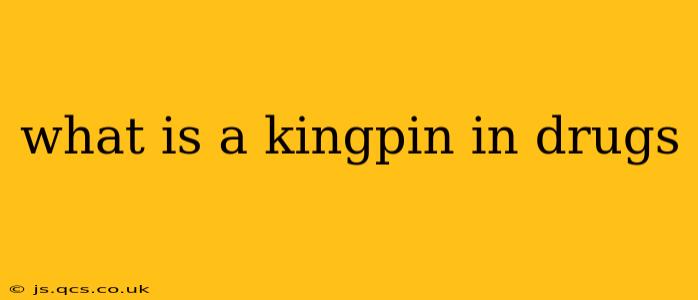The term "kingpin" evokes images of powerful, shadowy figures pulling the strings of vast, illegal drug empires. But what exactly is a kingpin in the context of the drug trade? It's more than just a catchy title; it represents a complex position at the apex of a criminal organization. This article will delve into the role, responsibilities, and implications of being a drug kingpin.
What are the Responsibilities of a Drug Kingpin?
A drug kingpin, also sometimes referred to as a drug lord or narco-trafficker, is essentially the head of a drug trafficking organization (DTO). Their responsibilities are far-reaching and encompass various aspects of the illegal business:
-
Strategic Planning and Oversight: Kingpins are responsible for the overall strategic direction of the DTO. This involves identifying and securing supply routes, managing distribution networks, and adapting to law enforcement pressure. They often dictate the types of drugs trafficked, target markets, and pricing strategies.
-
Financial Management: The illicit drug trade generates enormous profits. Kingpins are responsible for managing these funds, often laundering money through complex schemes to conceal its origins. This often involves investing in legitimate businesses to give the money a clean appearance.
-
Personnel Management: A successful DTO requires a hierarchical structure with numerous individuals involved in various roles, from couriers and distributors to accountants and enforcers. The kingpin oversees this workforce, making crucial hiring and firing decisions, and maintaining discipline within the organization.
-
Maintaining Relationships: Kingpins often cultivate relationships with corrupt officials, other criminal organizations, and even legitimate businesses to facilitate their operations. These connections are crucial for navigating the risks and challenges of the drug trade.
-
Conflict Resolution: Disagreements and disputes are inevitable within any large organization, and DTOs are no exception. The kingpin often acts as the ultimate arbiter, resolving conflicts to maintain stability and prevent internal fracturing.
How Does a Drug Kingpin Differ from Other Roles in a Drug Trafficking Organization?
While a kingpin sits at the top, numerous other roles exist within a DTO. The key differences lie in responsibility and authority:
-
Lower-level dealers and distributors: These individuals operate at the street level, directly selling drugs to consumers. They are significantly lower in the hierarchy and have far less influence.
-
Mid-level managers: These individuals oversee specific aspects of the operation, like transportation or finance, but they are answerable to the kingpin.
-
Enforcers: These individuals use violence and intimidation to protect the organization's interests and maintain control. They are typically subordinate to the kingpin or a mid-level manager.
What are the Risks Associated with Being a Drug Kingpin?
The life of a drug kingpin is inherently risky. The consequences of their actions are severe, with significant penalties including:
-
Long prison sentences: Kingpins face lengthy incarceration, often decades, if caught.
-
Asset forfeiture: Law enforcement agencies actively seize assets obtained through drug trafficking, including property, vehicles, and bank accounts.
-
Violence and retaliation: The drug trade is a violent world. Kingpins face the constant threat of violence from rival organizations, disgruntled employees, or law enforcement.
-
Extradition: Kingpins can be extradited to other countries to face charges, which can significantly complicate their legal battles.
How are Drug Kingpins Identified and Apprehended?
Identifying and apprehending drug kingpins requires extensive investigation and collaboration between law enforcement agencies worldwide. Tactics include:
-
Surveillance: Monitoring suspects' communications, movements, and financial transactions.
-
Informants: Using confidential sources to gather intelligence on DTOs.
-
Undercover operations: Infiltrating DTOs to gain evidence.
-
International cooperation: Sharing intelligence and collaborating with law enforcement agencies in other countries.
What is the Impact of Drug Kingpins on Society?
The actions of drug kingpins have devastating consequences for society, including:
-
Fueling addiction: The vast quantities of drugs trafficked by DTOs fuel addiction, contributing to health problems and social issues.
-
Violence and crime: The drug trade is often linked to violence, crime, and corruption.
-
Economic damage: Drug trafficking undermines legitimate businesses and contributes to economic instability.
In conclusion, the role of a drug kingpin is multifaceted and involves significant risks and responsibilities. Their actions have far-reaching consequences, impacting not only their organizations but also society as a whole. Understanding their role is crucial in combating the global drug trade and its devastating effects.
